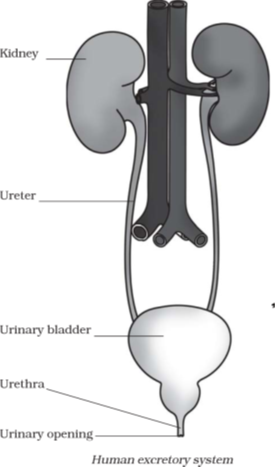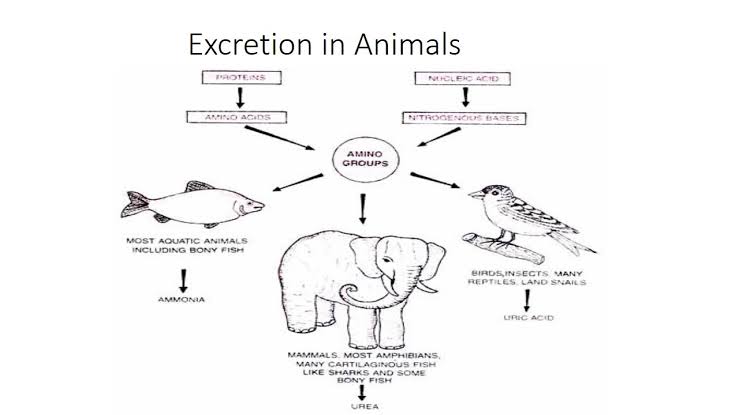- Books Name
- CBSE Class 7 Science Book
- Publication
- Param Publication
- Course
- CBSE Class 7
- Subject
- Science
EXCRETION IN ANIMALS
• When our cells perform their functions, certain waste products are released. These are toxic and hence need to be removed from the body. The process of removal of wastes produced in the cells of the living organisms is called excretion. The parts involved in excretion forms the excretory system.
• The way in which waste chemicals are removed from the body of the animal depends on the availability of water. Aquatic animals like fishes, excrete cell waste in gaseous form (ammonia) which is directly dissolved in water so called Ammonotelic.
• Some land animals like birds, lizards, snakes excrete a semi-solid, white coloured compound (uric acid) so called Uricotelic.
• The major excretory product in humans is urea so called Ureotelic.
Excretory System in Humans
Excretory system in humans consists of the following organs.
• A pair of kidneys
• Ureters
• Urinary bladder
• Urethra
Kidneys are bean-shaped structures located just above the waist. Each kidney consists of a large number of coiled tubes called nephrons. They act as filters and filter waste products from the blood which reach the two kidneys. The useful substances are absorbed back into the blood.
Waste products dissolved in water form the liquid urine. The urine contains 95% water, 2.5% urea and 2.5% other waste products.
A narrow tube called ureter runs from the inner side of each kidney. The two ureters from the two kidneys are connected to a large sac called bladder. Urine passes out from the kidney through the two ureters into the urinary bladder. It is stored in the urinary bladder. From the bladder, urine passes through another muscular tube called the urethra and is finally passed out through a urinary opening at the end of the urethra.

Other Organs of Excretion in Humans
1. Lungs: They remove carbon dioxide and water produced during respiration.
2. Skin: It removes urea, salt and excess water through sweat glands present in the skin.
3. Large intestine: The large intestine removes solid wastes.
4. Liver: It removes excess sugar by converting it into glycogen.
• Sometimes a person’s kidneys may stop working due to infection or injury. As a result of kidney failure, waste products start accumulating in the blood. Such persons cannot survive unless their blood is filtered periodically through an artificial kidney. This process is called dialysis.
• The sweat in human beings contain water and salts, which is also regarded as dilute wine. Sweat helps in keeping our body cool, besides removing waste materials.
Excretion in animals

Excretion, the process by which animals rid themselves of waste products and of the nitrogenous by-products of metabolism. Through excretion organisms control osmotic pressure—the balance between inorganic ions and water—and maintain acid-base balance. The process thus promotes homeostasis, the constancy of the organism’s internal environment. Every organism, from the smallest protist to the largest mammal, must rid itself of the potentially harmful by-products of its own vital activities.

 Param Publication
Param Publication
 Grow Career Publication
Grow Career Publication
